Explore
- Home
- About Us
- Services
- Blog
- Contact Us
Quick links
- Guide to Import
- Guide to Export
- ICEGATE
- DGFT
- Get DSC
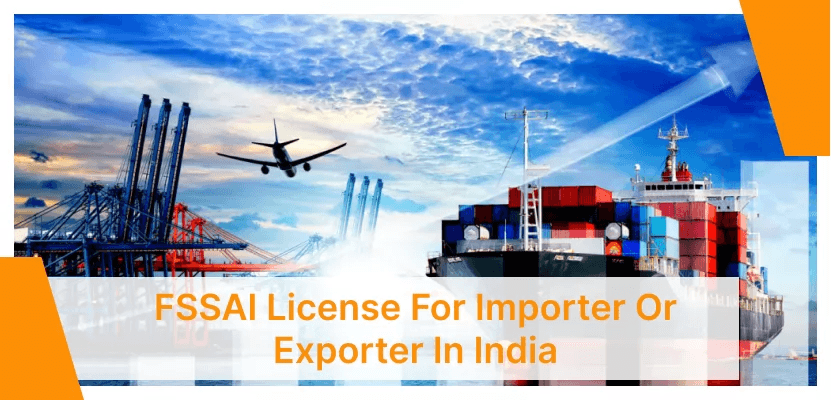
With India’s food export sector witnessing a remarkable surge driven by growing global demand for Indian agricultural produce, spices, processed foods, and health-based consumables, regulatory compliance has become the bedrock of successful international trade.
One of the most indispensable legal requirements in this context is obtaining a valid FSSAI export license from the Food Safety and Standards Authority of India (FSSAI).
This FSSAI Export license is not just limited to manufacturers; it is equally mandatory for merchant exporters—business entities that do not engage in food production themselves but source goods from third-party manufacturers for overseas markets.
Despite not altering or processing the food items, these entities fall within the purview of “food business operators” under the Food Safety and Standards Act, 2006, and hence must adhere to the same licensing norms.
Without a valid FSSAI Export license, merchant exporters risk customs clearance issues, shipment delays, export rejections, and substantial penalties under Indian law.
Moreover, international buyers often demand credible proof of food safety compliance, making the FSSAI export license a crucial prerequisite for maintaining both legal and commercial credibility in the global market.
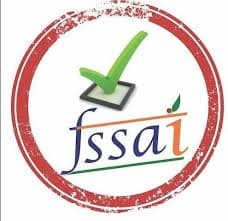
The Fhttps://fssai.gov.in/ood Safety and Standards Authority of India (FSSAI) is a statutory regulatory body constituted under the Food Safety and Standards Act, 2006, tasked with safeguarding and promoting public health by regulating and supervising food safety standards throughout the country.
For businesses operating in the food sector—including those involved in manufacturing, storage, distribution, retail, import, or export of food products—the possession of an FSSAI export license is not merely a formality but a legal mandate. The license issued by FSSAI acts as a seal of assurance that the food business operator complies with the comprehensive safety, hygiene, labeling, and quality norms prescribed by Indian law.
In the case of exporters and importers, especially those engaged in merchant export activities, securing an FSSAI Central License is particularly crucial.
The FSSAI export license is mandatory for any entity that exports food products across India’s borders, regardless of whether they directly manufacture the goods or procure them from third-party vendors.
Beyond ensuring compliance with domestic regulatory frameworks, the FSSAI export license plays a pivotal role in enhancing the reputation, trustworthiness, and acceptability of Indian food products in foreign markets. It reflects a commitment to internationally recognized food safety practices, thus helping exporters build strong trade relationships and meet the quality expectations of global importers and regulatory authorities abroad.
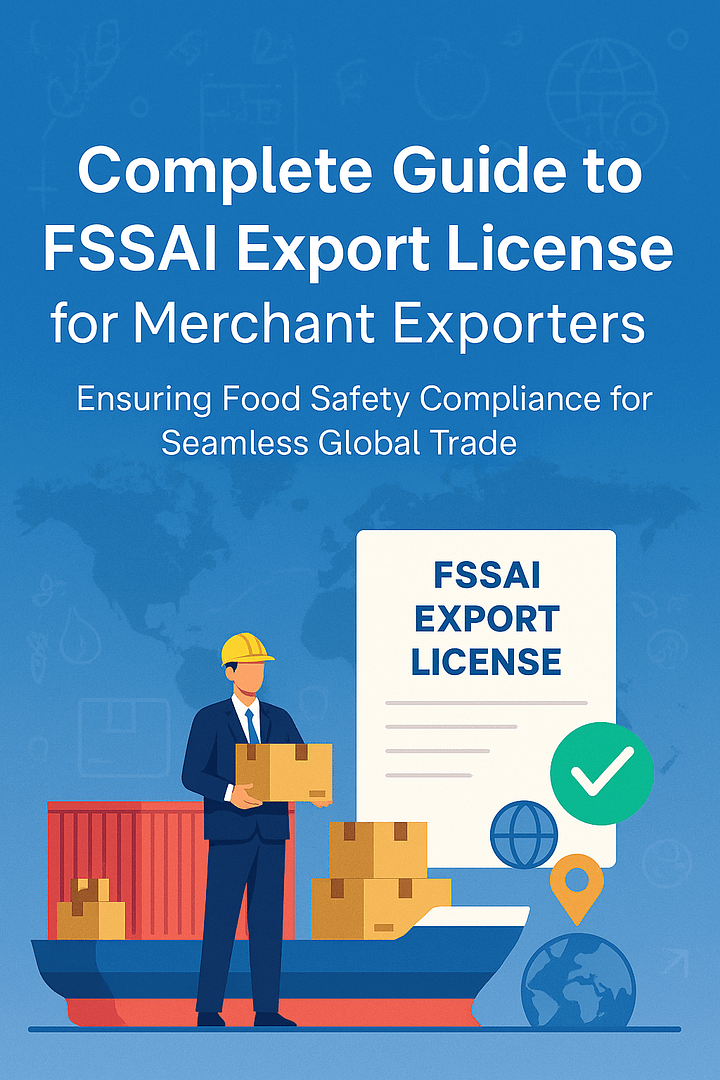
Yes, obtaining an FSSAI license is compulsory for merchant exporters involved in the food trade. A merchant exporter, although not a food manufacturer, plays a key role in sourcing, consolidating, storing, repacking, and exporting food products.
According to FSSAI regulations, any individual or entity involved in the handling, export, or distribution of food products must register or be licensed under the FSSAI framework. The requirement applies even if the exporter does not process the food themselves but is merely aggregating and exporting it.
In the absence of a valid FSSAI export license, the exporter is ineligible to move food consignments through customs and may face regulatory action from food authorities.
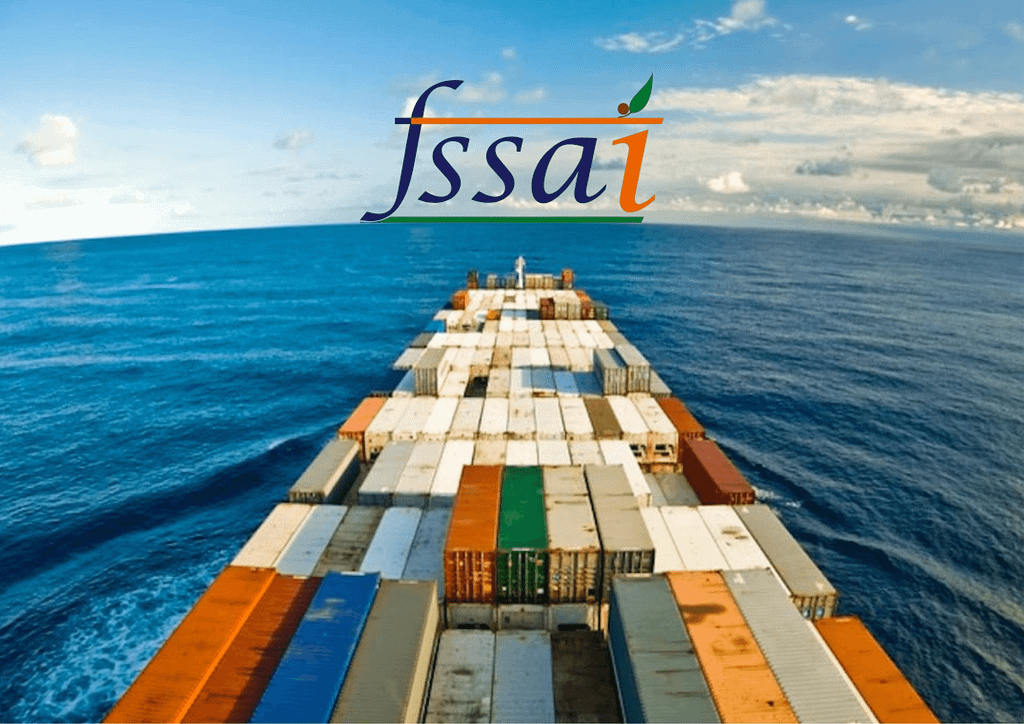
For food exports, quality assurance is critical. International buyers demand safety certifications, and Indian customs require licenses before allowing outbound shipments. The FSSAI export license acts as a seal of assurance that the food product meets India’s food safety norms, making it easier to meet international regulatory and buyer requirements.
Additionally, foreign countries often recognize Indian safety certification when clearing goods at their borders. Without this, exporters risk delays, rejections, and damage to their brand reputation. Moreover, the license supports traceability and accountability, allowing government agencies to track food origins in case of safety incidents or recalls.

There are three main types of FSSAI licenses, but only one is applicable to exporters, particularly merchant exporters:
A merchant exporter is an entity that procures goods from local manufacturers or suppliers and exports them without any processing or manufacturing activities of its own.
Under FSSAI norms, such exporters are still considered part of the food business ecosystem and must obtain a Central FSSAI Export License. This requirement ensures traceability, accountability, and safety of exported food items, even when exporters do not directly handle food production.
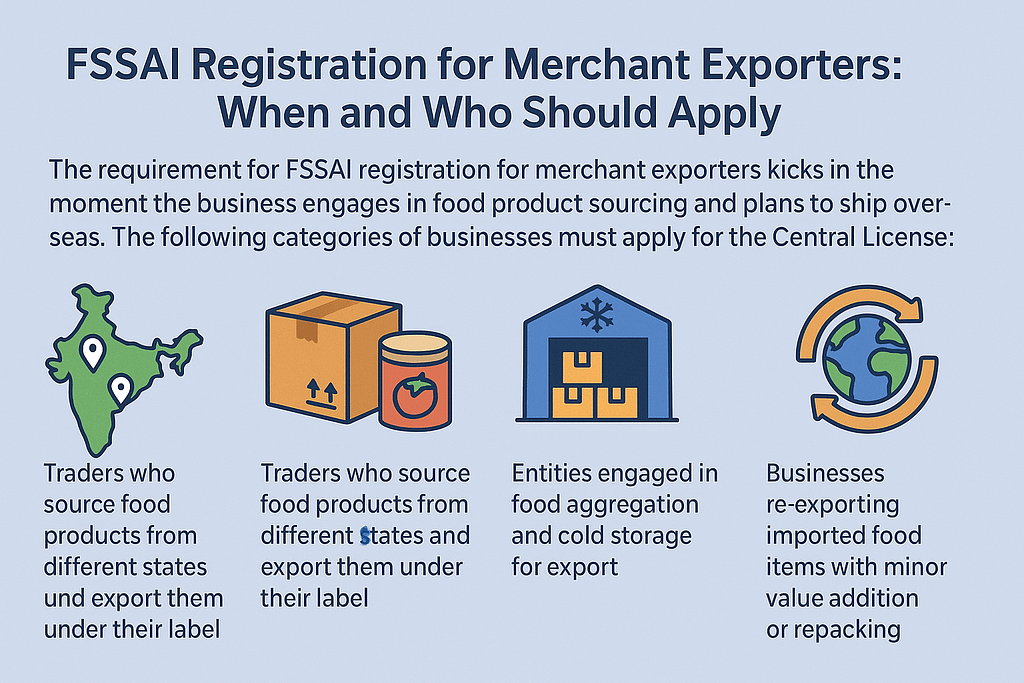
The requirement for FSSAI registration for merchant exporters kicks in the moment the business engages in food product sourcing and plans to ship it overseas. The following categories of businesses must apply for the Central License:
Even if you are a new exporter planning your first shipment, you must obtain the FSSAI export license prior to initiating the export process or registering with government export promotion councils.
To obtain an FSSAI license for merchant exporter, the following documents must be submitted:
The documents must be clear, legible, and compliant with FSSAI’s documentation standards to avoid rejection.
Exporters of food products from India are mandatorily required to obtain an Central FSSAI export License. This license is governed by the Food Safety and Standards Authority of India (FSSAI) and applies irrespective of the exporter’s annual turnover.
| License Type | Applicability | Government Fee (per year) | GST (18%) | Total Fee (per year) |
| Basic Registration | Turnover < ₹12 lakh/year (Not for exporters) | ₹100 | ₹18 | ₹118 |
| State License | ₹12 lakh – ₹20 crore/year (Not for exporters) | ₹2,000 – ₹5,000 | ₹360 – ₹900 | ₹2,360 – ₹5,900 |
| Central License | Exporters / Turnover > ₹20 crore | ₹7,500 | ₹1,350 | ₹8,850 |
Exporters must apply for the Central License only, regardless of their turnover.
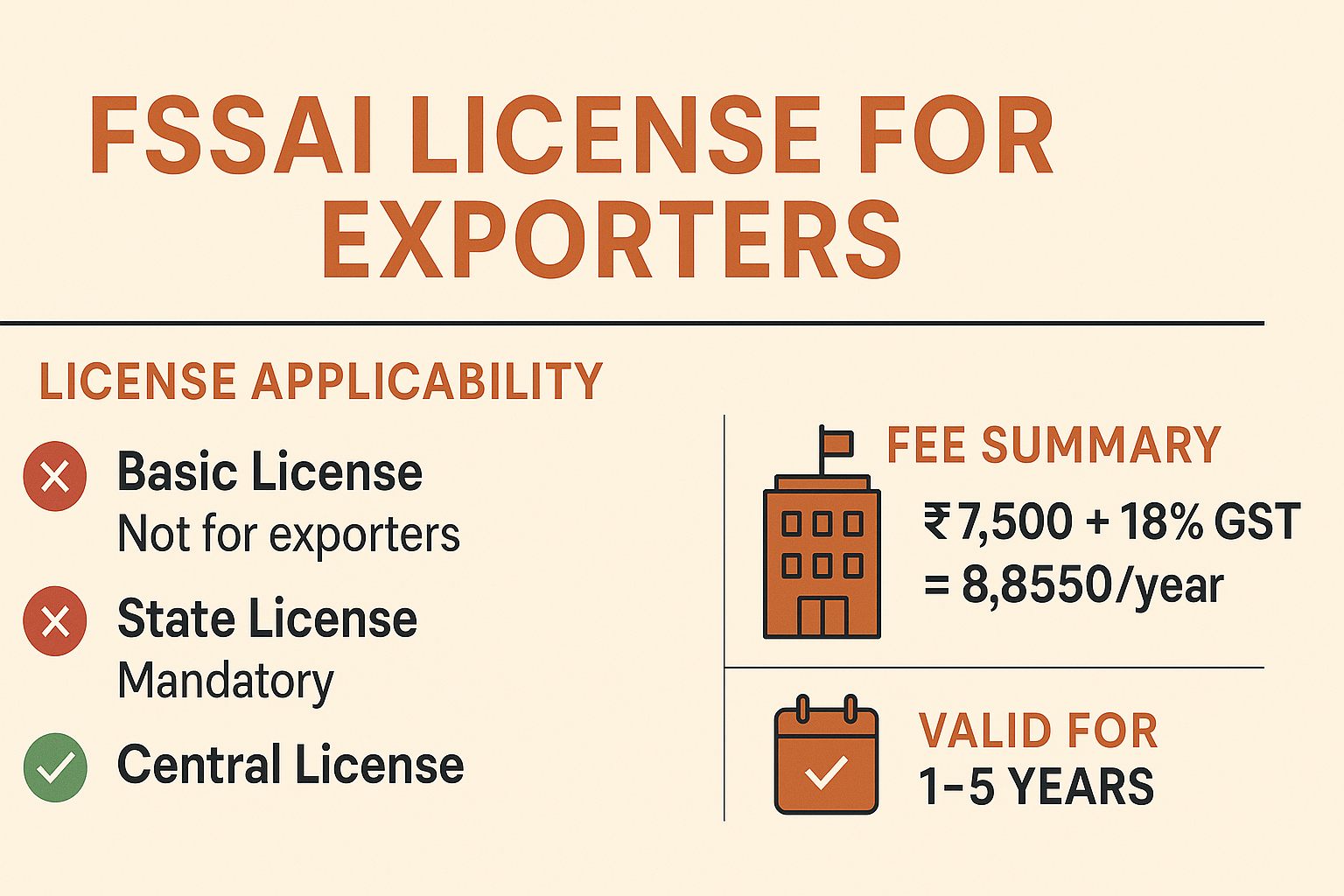
An FSSAI Central License is valid for a period of up to 5 years and must be renewed before expiry. It is advisable to apply for renewal at least 30 days before the FSSAI export license expiry date to avoid late fees or lapse in validity. Late applications attract a penalty of ₹100 per day.
If your export operations expand or if you add new food categories, product types, or business addresses, the license must be updated accordingly. FSSAI permits license modification by submitting a separate application with supporting documents.
Additional Costs
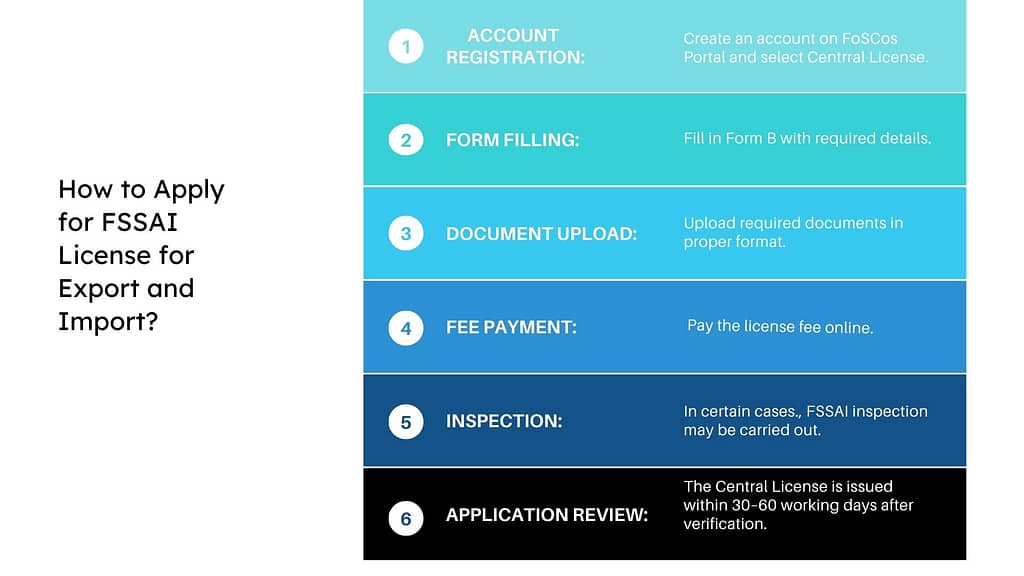
The process of obtaining the FSSAI license for import & export is entirely online through the FoSCoS portal. The step-by-step application process is as follows:
Operating as a food exporter without a valid FSSAI license can lead to severe regulatory consequences. These include:
For merchant exporters, ensuring compliance with FSSAI norms is not just a legal formality, but a critical business imperative.
The Food Safety and Standards Authority of India (FSSAI) plays a pivotal role in ensuring that food products manufactured, stored, distributed, or exported from India comply with stringent safety standards.
Established under the Food Safety and Standards Act, 2006, the authority is entrusted with setting benchmarks for food safety, regulating compliance, and enhancing consumer confidence both within India and globally.
For exporters, FSSAI acts as a gatekeeper, ensuring that only those food consignments that meet defined quality parameters can move beyond India’s borders.
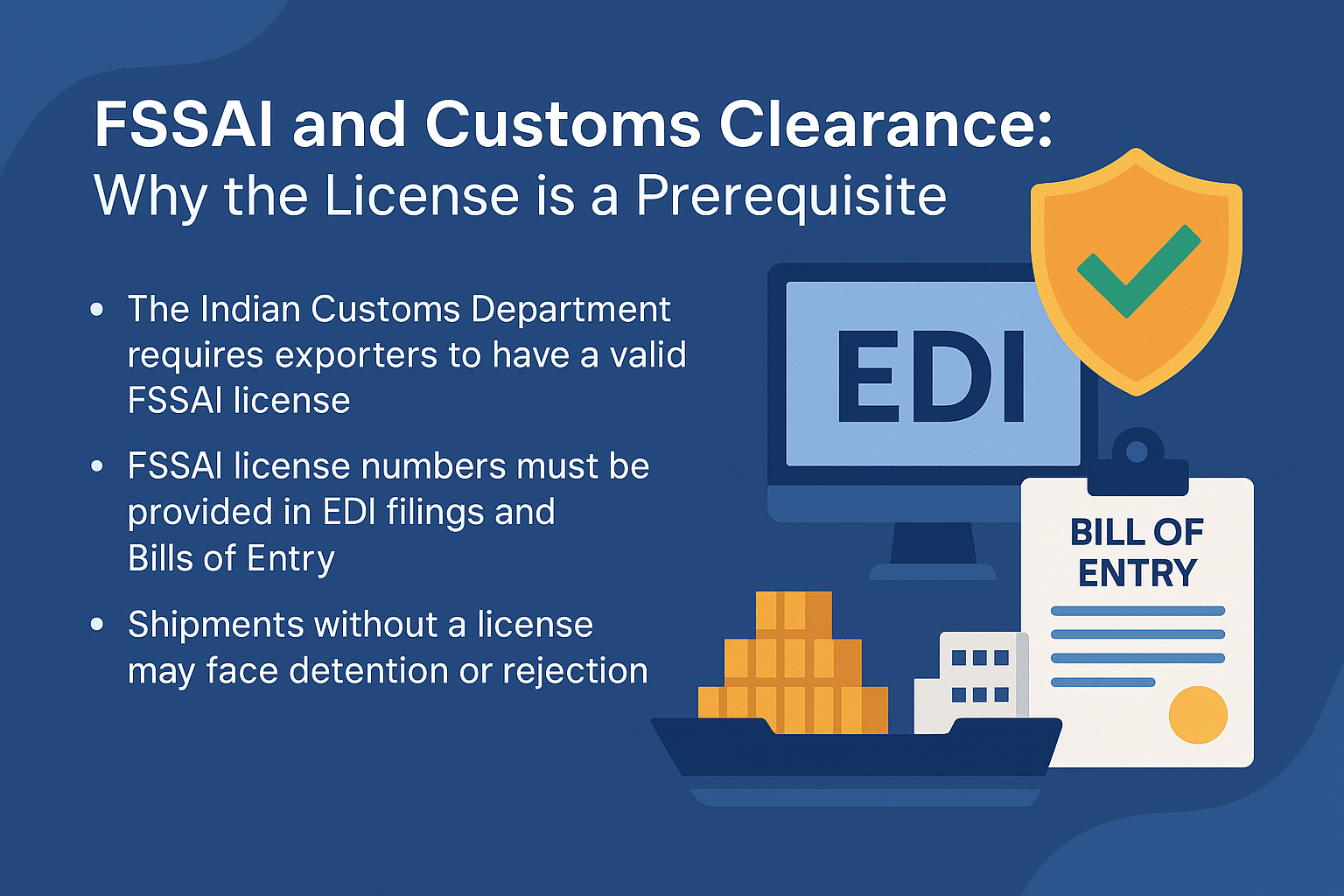
The Indian Customs Department works closely with FSSAI to ensure only licensed exporters are allowed to dispatch food consignments overseas.
FSSAI export license numbers are required during electronic data interchange (EDI) filings and Bill of Entry submissions. Lack of a valid license can lead to detainment, inspection, or outright rejection of export shipments.
Merchant exporters often rely on third-party manufacturers or co-packers for sourcing food items. In such cases, it is mandatory to declare these production units and provide their FSSAI export license numbers.
Exporters must ensure that these units are themselves compliant, failing which their license application may be rejected or revoked.
We offer comprehensive assistance in obtaining the FSSAI license for merchant exporters, including:
Our team ensures a seamless, error-free process so you can focus on scaling your business across borders while we manage your compliance.
With strict global regulations on food quality and safety, having an FSSAI export license is essential for merchant exporters aiming to succeed in the international market.
From improving credibility with overseas buyers to ensuring smooth customs clearance, the FSSAI export license provides both legal protection and market access. Exporters should approach FSSAI compliance not as a hurdle, but as a foundation for long-term success and brand integrity in global trade.
For expert assistance on your FSSAI registration or to consult about your food export setup, feel free to get in touch with our compliance team today.
Yes. Even without modifying the food or relabeling it, you are classified as a “food business operator” under FSSAI norms. Your role in the handling, storage, or logistics chain still triggers the requirement for a Central License.
Absolutely. FSSAI cross-verifies supplier licenses during application processing. If your manufacturer or co-packer is non-compliant, your application may be delayed or rejected outright.
Yes. Branding, relabeling, or repackaging makes you the “brand owner,” and your operations are viewed as more than passive trading. You must submit a detailed Food Safety Management System (FSMS) plan and possibly undergo an inspection.
Yes. Re-exporters—those importing food and sending it abroad with minor value additions like relabeling or repacking—are also subject to FSSAI Central License requirements under Indian law.
No individual product approval is required unless you’re exporting non-standardized food items. In that case, you must submit a declaration and supporting documents to FSSAI for clearance.
Only if the operations are coordinated from a central office. Otherwise, each operational premise (e.g., warehouse, repacking unit) involved in export logistics may need to be registered or declared as part of the license.
FSSAI license numbers are mandatory for EDI filings and customs clearance. The customs department cross-verifies this license at the port of loading. Missing or invalid license data can delay or block shipments.
Inspection is generally triggered if you’re involved in repacking, relabeling, or cold storage. If you operate purely as a logistics aggregator, inspection is often waived—though not guaranteed.
The FSSAI license is often requested as part of procurement due diligence by international buyers. It signals adherence to Indian food safety protocols, which align with Codex Alimentarius and WTO SPS standards—helping reduce clearance friction in destination countries.
Under Section 63 of the Food Safety and Standards Act, operating without a license can lead to penalties up to ₹5 lakhs or imprisonment up to 6 months. It may also result in blacklisting by export promotion councils and disqualification from government incentive schemes.
EXCELLENTTrustindex verifies that the original source of the review is Google. Had a really good experience with JParks India. Rahul sir helped me a lot with my import work and were always active and responsive. Whatever documents or guidance was needed, they handled everything smoothly and explained things clearly. Felt stress-free throughout the process. Very helpful team, definitely recommend them if you’re doing import or export.Posted onTrustindex verifies that the original source of the review is Google. Quick & reliable servicePosted onTrustindex verifies that the original source of the review is Google. I took import consultancy services from Mr. Rahul at Jparks India Private Limited, and I must say he has excellent knowledge of the process. Really appreciate his professionalism and support. highly recommended!Posted onTrustindex verifies that the original source of the review is Google. very prompt and authentic services. team very responsive and courteous.Posted onTrustindex verifies that the original source of the review is Google. Wonderful Service and Very Fast. Love to recommend everyone. Thank youPosted onTrustindex verifies that the original source of the review is Google. I can get your import and export support in the future and I need it...I hopePosted onTrustindex verifies that the original source of the review is Google. Good service and posstive resposePosted onTrustindex verifies that the original source of the review is Google. Words fastest service for IEC Certificate and many for your Business They really understand client problem.Posted onTrustindex verifies that the original source of the review is Google. I found Mr Rahul Kolge quite professional & ethicalPosted onTrustindex verifies that the original source of the review is Google. Very Good and prompt response by the team and the work was completed in A day Appreciate itVerified by TrustindexTrustindex verified badge is the Universal Symbol of Trust. Only the greatest companies can get the verified badge who has a review score above 4.5, based on customer reviews over the past 12 months. Read more







